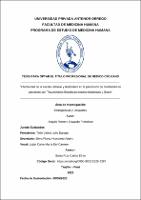Mostrar el registro sencillo del ítem
Efectividad de la escala Helsinki y Rotterdam en la predicción de mortalidad en pacientes con Traumatismo Encefalocraneano Moderado y Grave
| dc.contributor.advisor | Salas Ruiz, Carlos Efren | |
| dc.contributor.author | Angulo Romero, Oswaldo Francisco | |
| dc.creator | Angulo Romero, Oswaldo Francisco | |
| dc.date.accessioned | 2023-07-07T21:56:17Z | |
| dc.date.available | 2023-07-07T21:56:17Z | |
| dc.date.issued | 2023 | |
| dc.identifier.uri | https://hdl.handle.net/20.500.12759/10856 | |
| dc.description.abstract | Determinar si la escala Helsinki tiene mayor o igual efectividad que la escala Rotterdam en la predicción de mortalidad en pacientes con traumatismo encefalocreaneano del Hospital Regional Docente de Trujillo entre el periodo de Enero 2012 a Diciembre del 2019. Material y métodos: Se realizó un estudio de tipo transversal analítico retrospectivo de tipo prueba diagnóstica realizado en el Hospital Regional Docente de Trujillo, empleando una muestra censal en pacientes con diagnóstico de traumatismo encefalocraneano en el periodo de Enero del 2012 hasta Diciembre del 2019, los cuales cumplieron con los criterios de inclusión y obteniendo un total de 242 pacientes. Se calcularon los valores de sensibilidad, especificidad, valor predictivo positivo, valor predictivo negativo y exactitud diagnóstica de cada escala y fueron comparados para evaluar cual es más efectiva para predecir mortalidad en los pacientes con traumatismo encefalocraneano. Resultados: La escala Rotterdam obtuvo una sensibilidad del 74.4%, una especificidad del 74.4%, un VPP del 35.8% y un VPN del 93.8%. La escala Helsinki obtuvo una sensibilidad del 69.2%, una especificidad del 86.2%, un VPP de 49.1% y un VPN de 83.5%. En la comparativa se evidencia que entre la sensibilidad de la escala Rotterdam y el de la escala Helsinki no hay diferencia significativa (p=0.615) para predecir la mortalidad según los puntos de corte de cada escala, mientras que en la especificidad si se encontró diferencia significativa (p=0.003). Conclusión: La escala Helsinki tiene mayor efectividad en la predicción de mortalidad que la escala Rotterdam en pacientes con traumatismo encefalocraneano atendidos en el Hospital Regional Docente de Trujillo entre el periodo de Enero 2012 a Diciembre del 2019. | es_PE |
| dc.description.abstract | Determine if the Helsinki scale has greater or equal effectiveness than the Rotterdam scale in predicting mortality in patients with traumatic brain injury at the Teaching Regional Hospital of Trujillo between the period of January 2012 to December 2019. Material and methods: A retrospective analytical cross-sectional study of the diagnostic test type was carried out at the Teaching Regional Hospital of Trujillo, using a census sample of patients diagnosed with traumatic brain injury in the period from January 2012 to December 2019, who met the criteria inclusion criteria and obtaining a total of 242 patients. The values of sensitivity, specificity, positive predictive value, negative predictive value, and diagnostic accuracy of each scale were calculated and compared to assess which one is more effective in predicting mortality in patients with traumatic brain injury. Results: The Rotterdam scale obtained a sensitivity of 74.4%, a specificity of 74.4%, a PPV of 35.8% and a NPV of 93.8%. The Helsinki scale obtained a sensitivity of 69.2%, a specificity of 86.2%, a PPV of 49.1% and a NPV of 83.5%. In the comparison, it is evident that between the sensitivity of the Rotterdam scale and that of the Helsinki scale there is no significant difference (p=0.615) to predict mortality according to the cut-off points of each scale, while in the specificity a significant difference was found (p=0.003). Conclusion: The Helsinki scale is more effective in predicting mortality than the Rotterdam scale in patients with traumatic brain injury treated at the Teaching Regional Hospital of Trujillo between the period of January 2012 to December 2019. | en_US |
| dc.description.uri | Tesis | es_PE |
| dc.format | application/pdf | es_PE |
| dc.language.iso | spa | es_PE |
| dc.publisher | Universidad Privada Antenor Orrego | es_PE |
| dc.relation.ispartofseries | T_MED_3479 | |
| dc.rights | info:eu-repo/semantics/openAccess | es_PE |
| dc.rights.uri | https://creativecommons.org/licenses/by/4.0/ | es_PE |
| dc.source | Universidad Privada Antenor Orrego | es_PE |
| dc.source | Repositorio Institucional - UPAO | es_PE |
| dc.subject | Traumatismo Encefalocraneano | es_PE |
| dc.subject | Mortalidad | es_PE |
| dc.title | Efectividad de la escala Helsinki y Rotterdam en la predicción de mortalidad en pacientes con Traumatismo Encefalocraneano Moderado y Grave | es_PE |
| dc.type | info:eu-repo/semantics/bachelorThesis | es_PE |
| thesis.degree.level | Título Profesional | es_PE |
| thesis.degree.grantor | Universidad Privada Antenor Orrego. Facultad de Medicina Humana | es_PE |
| thesis.degree.name | Médico Cirujano | es_PE |
| thesis.degree.discipline | Medicina Humana | es_PE |
| dc.subject.ocde | https://purl.org/pe-repo/ocde/ford#3.02.27 | es_PE |
| renati.advisor.orcid | https://orcid.org/0000-0002-2525-7297 | es_PE |
| renati.author.dni | 70000431 | |
| renati.advisor.dni | 17843851 | |
| renati.type | https://purl.org/pe-repo/renati/type#tesis | es_PE |
| renati.level | https://purl.org/pe-repo/renati/level#tituloProfesional | es_PE |
| renati.discipline | 912016 | es_PE |
| renati.juror | Tello Valera, Julio Eulogio | |
| renati.juror | Elera Florez, Humberto Antero | |
| renati.juror | Luján Calvo, María Del Carmen | |
| dc.publisher.country | PE | es_PE |
Ficheros en el ítem
Este ítem aparece en la(s) siguiente(s) colección(es)
-
Medicina Humana [2969]




